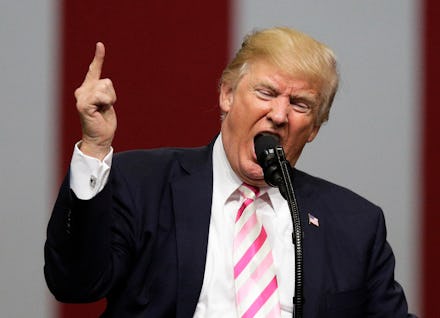Unlike his predecessors, Trump can’t stop trading insults with North Korea

In December 2014, the North Korean government slurred then-President Barack Obama with a racist insult: “Obama always goes reckless in words and deeds,” a government spokesperson said at the time, “Like a monkey in a forest.”
Washington and Pyongyang had been engaged in weeks of back-and-forth over the comedy film The Interview — in which Seth Rogen and James Franco play tabloid journalists who become involved in a CIA plot to assassinate Kim Jong Un.
The film was “illegal,” according to the Kim regime, which blamed Obama for its theatrical release — and for the internet disruption the country experienced after the United States accused it of hacking Sony Pictures over the satire.
The “monkey” insult was just the latest racial slur leveled at Obama by the North Korean government, which in May 2014 described him as a “dirty fellow” and said he should “live with a group of monkeys in the world’s largest African natural zoo and lick the breadcrumbs thrown by spectators.” The government also referred to him as a “wicked black monkey.”
But Obama, who was vacationing in Hawaii at the time of the December insults, didn’t publicly return the Kim regime’s provocations. He simply continued his vacation.
His successor, President Donald Trump, has reacted somewhat differently to the insults that Pyongyang has routinely leveled against U.S. leaders, from Hillary Clinton (a “school girl”) to John Kerry (who has a “hideous lantern jaw”) to former President George W. Bush (a “half-baked man”).
Rather than ignore North Korea’s barbs, Trump has returned the volley, threatening “fire and fury” against the regime, mocking Kim as “Little Rocket Man” and, on Tuesday, bragging that his nuclear button was “much bigger & more powerful” than his counterpart’s.
It was a stunningly Freudian reaction to Kim warning the U.S. that his nuclear button was “always on the desk in my office.” It was also a childish insult that has experts at best shaking their heads at a “foolish” president, and at worst concerned that he could inadvertently provoke a devastating war.
“It’s fucking insane,” Jeffrey Lewis, director of the East Asia Nonproliferation Program at the Middlebury Institute of International Studies at Monterey, said in an interview on Wednesday. “What you say matters. He sounds like some drunk at the bar, which is fine, except he’s not a drunk at the bar. He’s a president who has incredible military capability at his fingertips.”
Tensions between the U.S. and North Korea have been running high for months, as Trump and Kim exchange threats and frequently personal insults.
Kim has referred to Trump as a “dotard.” Trump, in turn, has repeatedly referred to Kim as “Little Rocket Man” and — in a particularly puerile tweet — called him “short and fat.”
“It’s extremely unhelpful,” Jenny Town, assistant director of the U.S.-Korea Institute at the John Hopkins School of Advanced International Studies, said. “What are we, 10? It’s unnecessary and counterproductive.”
Kim’s slights toward Trump are part of a long line of insults Pyongyang has doled out to leaders seen as unfriendly to the regime. But U.S. leaders have largely avoided responding, seeking to prevent escalating tension.
Trump, by contrast, has not only gotten himself into a game of brinkmanship with Kim and concerned allies, according to Town. By continuing to take the bait, he’s given North Korea material to claim their nuclear program is warranted.
“They can use Trump’s own words to justify the actions that they’re taking,” according to Town, who also serves as managing editor of 38 North — an online journal of analysis about North Korea.
Trump’s insults toward Kim mirror his tendency to punch back against people (and organizations) he considers rivals here in the U.S. — which he described years ago as being in his very “nature.”
He’s also not the first president to call North Korea out. Obama warned Kim that “we could destroy you,” and George W. Bush included the country in what he described as the “Axis of Evil.”
But Lewis says there’s a distinction between how Bush and Obama responded to North Korea’s provocations and Trump’s retorts.
“It was a deliberate decision in a specific context,” Lewis said of Obama and Bush’s warnings to North Korea. “This is not a deliberate decision. This is an impulsive act. It’s a random utterance.”
Lewis said these “antagonistic” jabs at Kim could carry real consequences.
“I worry about him stumbling into war,” he said.
Gary Samore, who served as coordinator for arms control and weapons of mass destruction under Obama, said in an interview that while Trump’s tweets and bellicose rhetoric are vacuous, they don’t do much to alter the situation on the Korean peninsula.
“I think they mainly show the president to be foolish and not very dignified,” Samore said. The bigger issue, he said, is the Trump camp.
“I don’t think the Trump administration knows what they’re doing,” he added.
While the administration has done a “good job” of increasing economic pressure on North Korea, Samore said, it’s failed so far to use it to leverage a deal of some kind.
“I don’t see any evidence that the Trump administration is thinking of such a plan,” Samore said.
But a coherent strategy may be difficult to come by, as evidenced by the mixed messages coming from Trump and Secretary of State Rex Tillerson, who has said he is pursuing diplomatic solutions on the peninsula, even saying in December he would consider sitting down with Pyongyang “without precondition.”
But Trump has undercut him on numerous occasions, suggesting that he was “wasting his time” with his attempts at diplomacy.
“It completely undermines the credibility of any of the State department overtures,” Town, of the U.S.-Korea Institute, said. “How can North Korea trust those messages when the messages are completely contradicted by the president?”